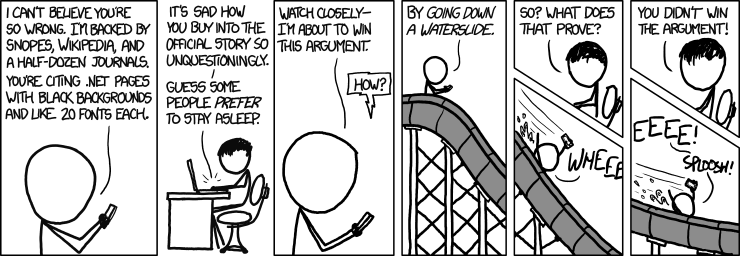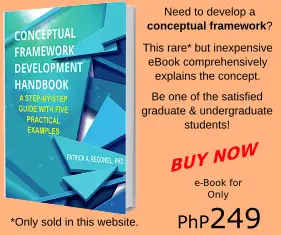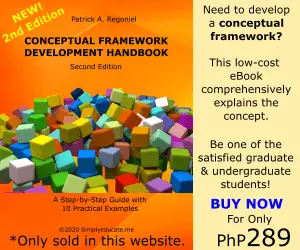Why is a conceptual framework in research required? Can you do away with it? What are the things you need to consider before working on it? This article answers this often challenging portion of a graduate student’s thesis requirement.
As a graduate student, perhaps now, you are getting ready to prepare a research proposal that will demonstrate your capacity to research and enrich knowledge about unresolved issues in your chosen field of specialization. Looking at your outline, one of the required sections says you have to develop your conceptual framework.
You ask yourself the following questions:
“Why do I have to prepare the conceptual framework?”
“Is it really necessary that I will have to prepare my conceptual framework in doing research?”
“If I do need to prepare my conceptual framework in research, how will I go about it?”
Questions on developing the conceptual framework in research come into focus once you find yourself taking advanced graduate school courses. Whatever your motivation in enrolling in advanced education, the outcome would be that you have developed the capacity to do research. This outcome is the culminating part of your painstaking effort to hurdle the many requirements of the core, specialization, and elective courses in the course curriculum.
You might be thinking, “Why the heck do I need to work on a conceptual framework in research anyhow?”
Then you recall your undergraduate years and how you were able to finish your thesis with your adviser’s guidance. Indeed, the conceptual framework is a part of that thesis.
But did you write it correctly in your undergraduate years? Chances are, you didn’t. You were in a rush. There’s a deadline to beat and face the busy panel of teachers who have many other things to do.
When the thesis defense period comes, there you are, together with your group mates, scampering here and there to comply with that darn thesis requirement. All those frustrations and time conferring with your adviser who sometimes cannot give you the answers you need comes back to memory. They are in a rush to complete their grades and submit them on time. Now, here you are again, facing the challenges of graduate school.
Now, since you have decided to enroll in graduate school anyway, here are three important points that you need to bear in mind.
Point 1: Why a Conceptual Framework in Research is Needed
Generate Ideas that Matter
Graduate school work requires that you are equipped with the correct concepts to engage in research as an essential part of your training. Your experience in researching in undergraduate years may not be (or is not) enough to provide you the impetus to do a serious study on issues and problems that require an incisive eye to discern the gaps in knowledge in the effort to provides solutions or answers that serve a purpose.
This idea goes on to say that as a graduate student, you have to make a difference, not indifference, in tackling the issues that confound many–the unexplored, unknown, or inadequately understood phenomenon. As a researcher, it is your role to develop an idea or ideas on how to dissect an issue or problem that needs resolution systematically.
As a graduate student, you have to make a difference, not indifference, in tackling the issues that confound many–the unexplored, unknown, or inadequately understood phenomenon.
Thus, you need to develop a conceptual framework in research to clarify things that boggle thinkers’ minds unless you unravel the mystery behind it. Developing a conceptual framework in research is not that easy, as, without the necessary training and experience, you are bound to do things haphazardly. You may just be duplicating the work of others, having nothing original to contribute from your musings.
Yes, finally, this is the critical element of developing your conceptual framework in research. Your MUSINGS. In other words, you are engaging in an exercise of looking at things characterized by reflection or deep thinking.
Point 2: Things to Consider Before Writing a Conceptual Framework in Research
Develop Your Higher Order Skills
A conceptual framework in research does not arise automatically. There is a need for you to think, not only superficially but deeply. That is why your graduate school training ideally takes place with your professors’ design of course materials that develop higher-order thinking skills or HOTS.
You will need to read many articles and books and sometimes engage in heated discussions with your classmates or even your adviser. But don’t go to the extent of showing you know better. It’s a no-no. Do it when you have already graduated.
No, I’m just kidding. Please don’t take me seriously. We can always be diplomatic in our approach.

The idea of reading a lot expands your knowledge in that particular topic you would want to do research. You get to know experts’ thoughts in their meta-analysis, well-cited landmark studies, and discussions during conferences.
Graduate students are meant to be the source of original ideas, particularly those working on their dissertations. Masteral level students confirm, validate, or test theories. Having hurdled the challenges of verifying, validating, or testing theories, doctoral-level students develop their original idea.
Why Come Up With a Theory?
Coming up with a theory will not happen overnight. It requires a meticulous study. Many hours are spent poring over the literature and seeing things in a different light, challenging others’ findings, and working out your construct of how things relate with each other.
A theory emerges, not only from a synthesis of the literature but from a well-tested, well-documented explanation of a phenomenon that is well-supported by evidence. There you have it.
You always need evidence to support your claim. Hence, you must systematically gather data.
You always need evidence to support your claim. Hence, you must systematically gather data.
Think Out of the Box
Doctoral work is not easy. A Ph.D. means nothing but a recognition that you know very little. It is not something to brag about having finished such a degree. It is a humble recognition that the more you know about a thing, i.e., your specialization, the less you know about other things. After all those readings, you will realize that there is more to explore in the vast world of the unknown.
As a graduate student, you have to think outside of the box. It would be best if you undid years of conditioning to go back to that state when you were a young child.
Why?
That’s because a child keeps on asking questions, looking for answers to live and adapt in the world that he or she will be a part of. Curiosity is the key to knowledge. Just explore and discover something new.
Here’s an excellent speech by Giovanni Corazza at TEDxRoma on thinking out of the box.
The Importance of Planning
Before you gather data, you need a plan, and that plan needs the guidance of a conceptual framework. It is your thinking framework in your quest for understanding things that remain an enigma that warrants investigation.
The conceptual framework lets you focus on what important variables need to be examined. It sets the stage for a systematic, cost-effective, and careful examination of the world’s challenges, issues, and problems.
Point 3: Conceptual Framework as a Tool in the Research Journey
At this point, you may perhaps already have a good foundation on why a conceptual framework in research matters. Your journey into the world of the unknown and constant quest for the truth will be ridden with dilemma, uncertainty, and mystery.
But armed with a tool to understand how things work–the conceptual framework–you have a ready tool to examine and dig deeper into confounding issues. It’s like riding the boat of uncertainty in the sea of knowledge. The conceptual framework serves as the rudder that guides the boat to reach your destination–the Island of Truth.

Examples of Conceptual Framework in Research Topics of Different Disciplines
To jumpstart the development of your conceptual framework, I have drafted five examples of conceptual frameworks in different fields of specialization based on a brief review of available literature in my 2016 eBook. I added five more on various other disciplines in the second edition. I demonstrate how conceptual framework development is done in the simplest way I can respond to the many requests from students worldwide.
There are just so many queries or requests on how to do it and requests to have more examples in specific disciplines. I understand it’s a challenge to teach what you preach. And I have to do it the best way I can in all the fields I can relate.
Why the eBook Project?
The eBook project was a demand-driven task to cater to students’ needs. And I believe it’s an advantage to become a generalist who knows a little about everything. I do the writing, the editing, the lay-outing, the designing, marketing, just about everything. So I keep on learning whatever I can lay my hands on to do the required tasks.
Well, honestly, I enjoy it. I am a Jack-of-All-Trades. Master of everything. That’s just a pun to make you laugh.
I smile as I write this. I – love – writing so much.
Hundreds of comments were made on my post on conceptual framework development by the readers. Initially, I responded by answering the comments and even went out of my way to email the students detailed answers to their queries, naming the variables, and drawing the paradigm to help them out.
But the time available for such a detailed answer to students got me so occupied. I empathize that these students may have difficulty in coming up with their conceptual framework to guide them in their research. And I could sense their lack, perhaps inadequate research training.
Hence, I compiled some of these queries and provided much more detailed answers in my eBooks to help graduate students, even undergraduates, develop their conceptual framework in research. They need a lot of examples to figure out how it’s done.
Now I’ve got two eBook editions to guide students. The original one was written in 2016, and the second, the updated edition (2020), which covers more examples and areas of discipline. I added supplementary material to enable the users to come up with their conceptual framework.
If you are one of these students who need such assistance, just pick the one you believe can serve your needs and benefit, just like the hundreds of students looking for guidance. At this writing, I found out that the original eBook has garnered 71 citations in Google Scholar. I think it has become an excellent reference for everyone.
Just click on the eBook to see its description, and you’re on your way.
Your purchase will help this site grow and make the educational articles available to everyone. To all who previously bought the original eBook, thank you very much for your support.
Now the site has just moved to a faster hosting mode to reach more users and enable more students to surf most efficiently using their simple android mobile phones. Better hosting means less time spent by students online to get the information that they need. Their quick access means more savings to pay for other needs.
I keep on optimizing Simplyeducate.me for a better user experience. If only these things are free, I will offer everything you read on this site for no bother, as this is just my hobby gone to something else.
Keep safe always from the pesky virus. Don’t let this pandemic stop you from learning. Let’s make learning easy and enjoyable in these difficult times.
Please write your suggestions if you have anything to recommend to improve the services of this site. Your thoughts are valuable inputs to make learning a worthwhile and pleasurable experience.
All of these in the name of science as we know it. Enjoy the journey!
© 2020 November 2 P. A. Regoniel




